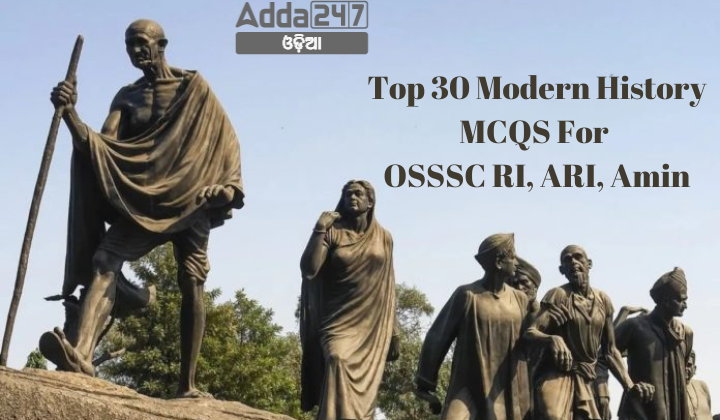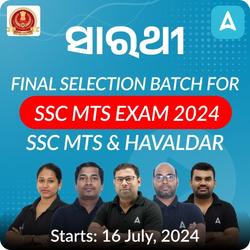Preparing for competitive exams such as OSSSC RI (Revenue Inspector), ARI (Assistant Revenue Inspector), Amin, SFS, or ICDS Supervisor often requires a strong grasp of historical events. Modern history, especially, forms a significant part of the syllabus, covering crucial periods and events that shaped the world as we know it today. To aid in your preparation, here are 30 multiple-choice questions (MCQs) focusing on modern history:
Top 30 Modern History MCQs for OSSSC RI,ARI, Amin, SFS, ICDS Supervisor
- Who was responsible for the introduction of the Subsidiary Alliance System?
(a) Warren Hastings
(b) Lord Cornwallis
(c) Lord Wellesley
(d) Lord Amherst
Ans: (c) Lord Wellesley - Who founded the Indian Society of Oriental Art to revive ancient art traditions in India?
(a) Abanindranath Tagore
(b) Ravindranath Tagore
(c) Surendranath Ganguly
(d) Mukul Dey
Ans: (a) Abanindranath Tagore - Who defended Aurobindo Ghosh in the Alipore conspiracy case?
(a) Tej Bahadur Sapru
(b) Motilal Nehru
(c) Jawahar Lal Nehru
(d) Chitranjan Das
Ans: (d) Chitranjan Das - Who initiated the Ganapati Festival in 1893, giving it a national character?
(a) Ganesh Damodar Savarkar
(b) Nana Patil
(c) Bal Gangadhar Tilak
(d) Vinoba Bhave
Ans: (c) Bal Gangadhar Tilak - In which year did Calcutta become the capital of British India?
(a) 1768
(b) 1770
(c) 1772
(d) 1776
Ans: (c) 1772 - Which Act is associated with Lord William Bentinck’s tenure?
(a) Charter Act of 1833
(b) Regulating Act of 1773
(c) Pitt’s India Act
(d) Government of India Act of 1858
Ans: (a) Charter Act of 1833 - What was the main outcome of the First Afghan War?
(a) Treaty of Amritsar
(b) Treaty of Lahore
(c) Treaty of Seringapatam
(d) Treaty of Peshawar
Ans: (d) Treaty of Peshawar - Who established the Ryotwari System?
(a) Lord Hastings
(b) Lord Dalhousie
(c) Lord Auckland
(d) Lord William Bentinck
Ans: (a) Lord Hastings - Which viceroy was in power during the revolt of 1857?
(a) Lord Canning
(b) Lord Dalhousie
(c) Lord Ripon
(d) Lord Lytton
Ans: (a) Lord Canning - Which viceroy is known for the establishment of the High Courts at Calcutta, Bombay, and Madras?
(a) Lord John Lawrence
(b) Lord Lytton
(c) Lord Curzon
(d) Lord Minto II
Ans: (a) Lord John Lawrence - Which act was repealed by Lord Ripon?
(a) The Vernacular Press Act
(b) The Arms Act
(c) The Rowlatt Act
(d) The Indian Councils Act
Ans: (a) The Vernacular Press Act - Which Act introduced by Lord Dalhousie laid the foundation for the Indian railways?
(a) Wood’s Despatch
(b) Charter Act of 1833
(c) Government of India Act of 1858
(d) Regulating Act of 1773
Ans: (a) Wood’s Despatch - Who was the first Viceroy of India?
(a) Lord Canning
(b) Lord Dalhousie
(c) Lord Ripon
(d) Lord Lytton
Ans: (a) Lord Canning - Who was responsible for the establishment of the Indian National Congress?
(a) Lord Lansdowne
(b) Lord Dufferin
(c) Lord Ripon
(d) Lord Lytton
Ans: (b) Lord Dufferin - Which viceroy is associated with the annulment of the Partition of Bengal?
(a) Lord Hardinge II
(b) Lord Chelmsford
(c) Lord Linlithgow
(d) Lord Minto II
Ans: (a) Lord Hardinge II - Which Act was introduced during Lord Linlithgow’s tenure?
(a) Government of India Act of 1935
(b) The Rowlatt Act
(c) The Vernacular Press Act
(d) The Arms Act
Ans: (a) Government of India Act of 1935 - Which event did not occur during Lord Chelmsford’s tenure?
(a) The Jallianwalla Bagh massacre
(b) The Lucknow Pact
(c) The Government of India Act of 1919
(d) The Non-Cooperation Movement
Ans: (d) The Non-Cooperation Movement - Which viceroy is known for the implementation of the Morley-Minto Reforms?
(a) Lord Minto II
(b) Lord Linlithgow
(c) Lord Reading
(d) Lord Willingdon
Ans: (a) Lord Minto II - Which significant legislation was passed during Lord Irwin’s tenure?
(a) Government of India Act of 1935
(b) The Rowlatt Act
(c) The Simon Commission
(d) The Indian Councils Act
Ans: (a) Government of India Act of 1935 - What major change did the Government of India Act 1858 bring?
(a) Transfer of power from the East India Company to the British Crown
(b) Introduction of the Doctrine of Lapse
(c) Establishment of the Indian National Congress
(d) The Partition of Bengal
Ans: (a) Transfer of power from the East India Company to the British Crown - Who was the Viceroy during the establishment of the Durand Commission?
(a) Lord Lansdowne
(b) Lord Curzon
(c) Lord Minto II
(d) Lord Ripon
Ans: (b) Lord Curzon - Which viceroy was associated with the Repeal of the Vernacular Press Act?
(a) Lord Ripon
(b) Lord Willingdon
(c) Lord Reading
(d) Lord Chelmsford
Ans: (a) Lord Ripon - Who was the Viceroy during the signing of the Gandhi-Irwin Pact?
(a) Lord Linlithgow
(b) Lord Irwin
(c) Lord Willingdon
(d) Lord Reading
Ans: (b) Lord Irwin - Which event marked the beginning of the British Crown’s direct rule in India?
(a) The Revolt of 1857
(b) The Sepoy Mutiny
(c) The Treaty of Amritsar
(d) The Battle of Plassey
Ans: (a) The Revolt of 1857 - Who was the Viceroy when Queen Victoria assumed the title of ‘Kaiser-i-Hind’?
(a) Lord Lytton
(b) Lord Ripon
(c) Lord Dufferin
(d) Lord Reading
Ans: (a) Lord Lytton - Which Act was passed during the tenure of Lord Reading?
(a) The Government of India Act of 1935
(b) The Indian Councils Act of 1909
(c) The Rowlatt Act
(d) The Vernacular Press Act
Ans: (a) The Government of India Act of 1935 - Who was responsible for the introduction of the Doctrine of Lapse?
(a) Lord Canning
(b) Lord Dalhousie
(c) Lord Hardinge II
(d) Lord Wellesley
Ans: (b) Lord Dalhousie - Which viceroy’s tenure saw the launch of the Non-Cooperation Movement?
(a) Lord Chelmsford
(b) Lord Irwin
(c) Lord Linlithgow
(d) Lord Willingdon
Ans: (b) Lord Irwin - Who was the Viceroy during the Dandi March?
(a) Lord Linlithgow
(b) Lord Willingdon
(c) Lord Irwin
(d) Lord Reading
Ans: (c) Lord Irwin - Which of the following was NOT introduced by Lord Curzon?
(a) Indian Universities Act
(b) Appointment of Police Commission
(c) Repeal of the Vernacular Press Act
(d) Partition of Bengal
Ans: (c) Repeal of the Vernacular Press Act










